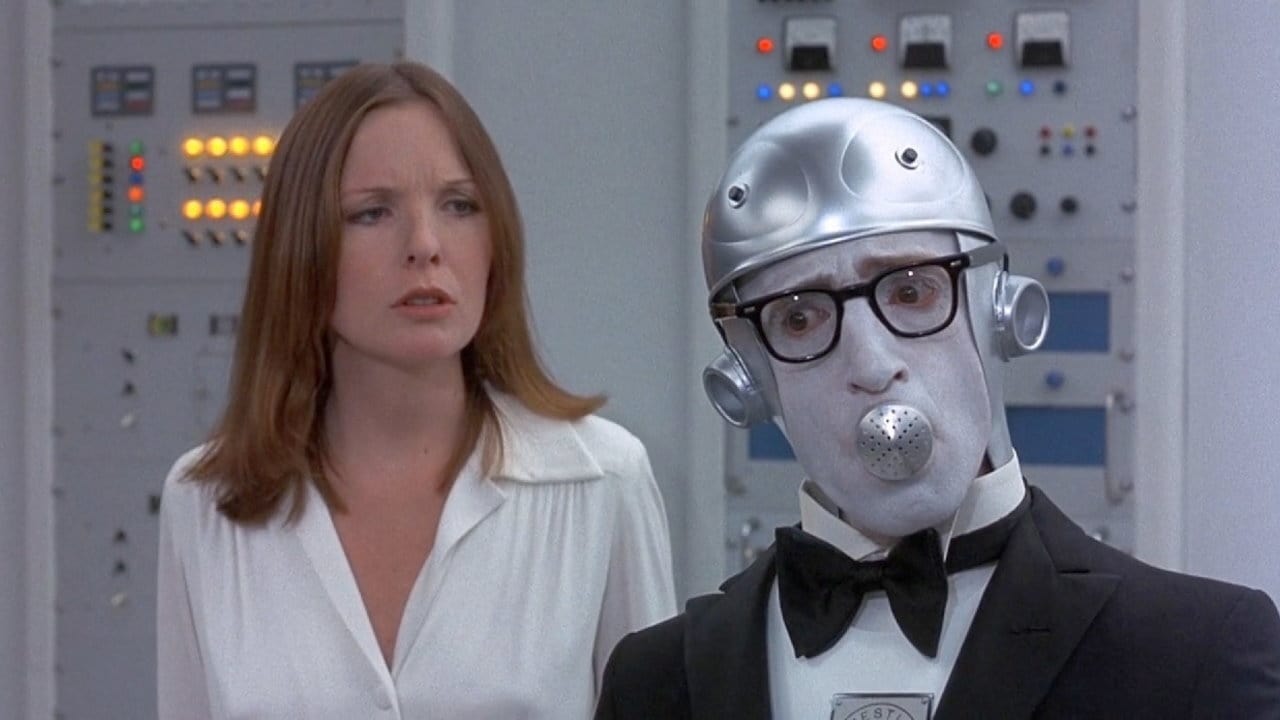

Viewing writer and director Woody Allen's early films in chronological order provides an interesting and traceable path from motor-mouthed clown to accomplished auteur, not only in terms of tone and subject matter, but also from a purely filmmaking point of view. He had tackled satire back in 1971 with Bananas, but really knew how make it work just two years later with Sleeper, one of his most popular films, and one of his last slapstick comedies before he moved on to maturer work like Annie Hall and Interiors, his love letter to Ingmar Bergman. Revelations concerning his private life continue to concern, baffle and appal, but if you can put these uncomfortable allegations aside (which is understandably a big ask for some people), there is still plenty to admire about Allen's contribution to comedy and cinema as a whole.Sleeper concerns Miles Monroe (Allen), a jazz musician and owner of a health-food store who goes in for a routine surgical procedure only to be cryogenically frozen without his knowledge and revived some 200 years in the future. The world he wakes up to is one governed by a mysterious dictator known as 'The Leader', who runs the country like a police state, with every citizen numbered and monitored like something straight out a George Orwell novel. The doctors who bring him out of his frozen state do so illegally, in the hope that Miles' exclusion from the government's register will allow him to fly under the radar and assist with the revolution. But the authorities are soon onto the rogue doctors, and Miles must flee into the countryside and into a society he knows little about. Improvising, he disguises himself as a robot butler and falls into the home of narcissistic bohemian Luna (Diane Keaton).Naturally, much hilarity ensues, with Allen embracing the physical comedy of silent greats Charlie Chaplin, Buster Keaton and The Marx Brothers, and dialling down his neurotic monologuing shtick. Luna prefers to remain ignorant at first, but after learning more from Miles, turns into full-on revolutionary. As with most comedies, some jokes fall flat, especially when Allen leans on the sexual humour such as the 'Orgasmatron', but this is probably Allen's funniest film, with the chemistry forged with Diane Keaton on the set of Play It Again, Sam effortlessly carrying over to into this. In fact, Keaton may even outshine her co-star. Her dialogue with Allen provides many opportunities for their ideals and social attitudes to clash, and as both characters grow, Sleeper serves up some surprisingly philosophical insights. Big Brother is indeed watching, and although this is a world full of buffoons easily distracted by Miles' shenanigans and the technology proves just as unreliable as it is today, its a pretty horrific place to be.
... View MoreThe Three Acts: The initial tableaux: In 1973, clarinetist and health food store owner Miles Monroe goes to hospital for a minor operation to repair ulcer damage. In 2173, he is revived from cryogenic stasis by rebel physicians.Just as his orientation starts to succeed, the police raid the health facility; his revival was illegal.To escape, Miles disguises himself as a robotic servant. He is delivered to the house of citizen Luna Schlossel, who assigns him tasks that illustrate life in 2173.Delineation of conflicts: The State, under the direction of The Leader, seeks to have everyone fully assimilated into society. Miles kidnaps Luna to escape yet another police raid. Luna is initially loyal to the State, but when captured and threatened with mind wipe, she converts to the rebel cause.Miles is captured, but not before Luna escapes with his help. Miles is assimilated by the State. Luna finds the resistance, and becomes enamored of Enro, the resistance boss, and with his ideology. By the time Luna and Miles meet again, their positions have reversed, and he does not remember her.Erno tasks Luna with getting Miles to the rebel camp. They set about restoring Miles' memory. Erno sends Luna and Miles to stop the Aries project. The State, of course, has other ideas. Miles' jealousy threatens the rebel mission.Resolution: The showdown is about the fate of the Aries project (not sure about the spelling here; I think I auto-corrected it).
... View MoreSince I've used up all my superlatives to describe Allen's comical genius in my ecstatic review of "Love and Death, I would start this review with a comparison: Woody Allen is the Stanley Kubrick of comedy.Let me explain this. Allen explored as many areas as Kubrick at the dawn of his glorious and so prolific career. He made a political pamphlet like "Paths of Glory", a film set in an oppressive dystopian future like "A Clockwork Orange" and a picaresque war epic à la "Barry Lyndon". Granted "Bananas", "Sleeper" or "Love and Death" don't compete in the same categories than the movies I mentioned, yet they all make speak some significant truths about our own humanity. Kubrick denounced the danger of technology, greed, power, politics, from their dehumanization effect, Allen uses humor to highlight their inner absurdity when put in the same equations than what matters most in life: sex, love, life itself and naturally, death.Allen's intelligence has nothing to envy on Kubrick except it's more appealing in the way it subtly lies underneath the cream-pie humor. And after watching, I mean, experiencing "Sleeper": Woody Allen's take on the Sci-fi genre, I knew that Allen was the greatest comical director of his generation, standing above Mel Brooks, Benny Hill and Monty Python for his unique capability to enthrall us with the simple process of thinking. You could tell that all the "Bananas", "Sleepers" and "Everything You Wanted to Know About Sex" were all leading to a much higher summit of intelligent craziness (or crazy intelligence). And "Sleeper" is only one little step below "Love and Death", which doesn't make it any less enjoyable.So, Woody Allen is Miles Monroe, a jazz clarinetist and sympathetic owner of "Happy Carrot" Health Food shop, subjected to an unwanted cryopreservation, he's awakened 200 years later, in 2173 in the kind of future that would make anyone miss a year like 1973. One hilarious moment involves a scientist who concluded after watching footage of Howard Cosell's TV program that it was used as penal punishment. The laughs go on when Miles is asked to give some insights about such distinguished gentleman as Charles De Gaull, Joseph Stalin and Tchangaitchek, the comments were so funny I was almost disappointed that it didn't include a picture of Hitler. Maybe that was too risky but how about that guest in the socialite party wearing an outfit with a Swastika, that called for a reaction never mind. Stranded in an unwanted but so existent future, Monroe's comments on his 200-year lethargy provide some of the most delightful pieces of verbal humor. When Diane Keaton, as Luna, a socialite girl, asked him how is it feels to have had 200 years without sex, he specifies "204, if you count my marriage", he also assumes he should be collecting social security at that time, this is how so 70's, he's still hooked up in his mind. But he has to deal with a police state, where not only he's alone, but he's the only one without a biometric record, hence his choice by a group of doctors to join an underground rebellious group and prevent a secret plan known as 'Aries Project'. Allen is an average schmuck who ran a rather purposeless life and gets caught in the middle of a rebellion where he becomes the chosen one. That's the core of most comedies: an ordinary guy in an extraordinary situation, but the Allenian twist changes everything, the guy is more exceptional than any other around him. At a time where sex has become ensured by a convenient machine named orgasmitron, when joints have been replaced by a weird ball with inexplicable sexual effects, when men and women believe in free love, Monroe's all intellectual material is getting shaken up, but resists nonetheless. And after admitting that he didn't believe in God, because it's too distracting, or in science because it's too restricting, he reaffirms his attachment to the only real things that count in life: sex and death, death even has an edge because it's rarely followed by nausea. If the conclusion seems sentimental, it's still the wisest response to the whole non-sense brought-up by the world and the proof that besides comedy, Allen has also a talent to create great romances.And beyond the undeniable 'makes-you-think' merit of the film, it's also an opportunity to enjoy pure Allen's slapstick, something that goes on the same level than the pioneers such as Buster Keaton or Charlie Chaplin, with a daringness that only he can get way. His catatonic state in the beginning might only inspire some timid chuckles but it goes on and on, until it gets desperately funny. From him trying to pass for a robot in a van full of other robots, trying to disguise as one, but can't do without his trademark glasses, hence Luna's desire to have a 'more aesthetically pleasing' one. Allen's robot-walk and his struggle with a giant pudding with a broom is, no pun intended, the icing on the cake. The rest involves a chase on the air, and on-the-water where he still find the opportunity of a good joke "I hate you", screams a hysterical Luna, "don't get too upset", calmly retorts Monroe. And of course, there's the great reinvention of the banana peel gag, you can see it coming but the way he exploits it only belongs to him. By the way, Allen has unique talent to find the right comical word, the 'banana the size of a canoe' foreshadows some classic "Buick" line (not surprising that comedic screenwriters advises to use words with the sound 'k', for their humorous impact).So between the sleeper over 2 centuries of dehumanization or the slipper over a giant banana peel gag, you have the two polar facets of Woody Allen between which he's able to express his comical talent to its fullest.
... View MoreWoody Allen aka Mr.Cinema Delivers A Winner Once Again in his 1973 cult-classic 'Sleeper'. A Terrific Sci-Fi Comedy, that comes in-tact with a host of good laughs.'Sleeper' Synopsis: A nerdish store owner is revived out of cryostasis into a future world to fight an oppressive government.'Sleeper' is amazing work. Allen & Marshall Brickman's Screenplay is a work of genius. They come up with a terrific concept, which translates into an equally terrific film. Each & Everything works! Allen's Direction, As Always, is Awe-Inspiring. Cinematography by David M. Walsh is good. Editing & Art Design, are wonderful.Performance-Wise: Allen delivers a marvelous performance in the central role. He embodies the character & delivers one of his finest performances. He's a treat to watch from start to finish. Diane Keaton is ever-dependable. John Beck is first-rate. Susan Miller leaves a mark. Others lend support.On the whole, 'Sleeper' is simply, unmissable. Mr.Cinema RULES!
... View More